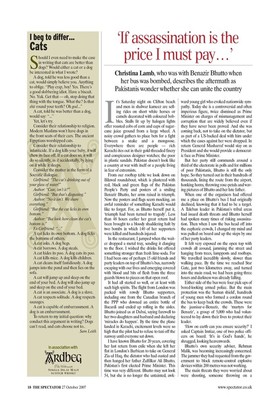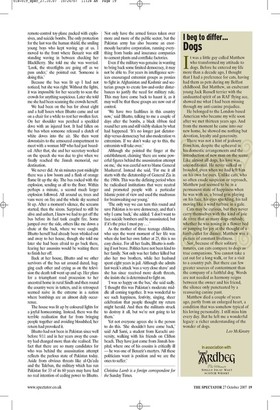'If assassination is the price I must pay. . . '
Christina Lamb, who was with Benazir Bhutto when her bus was bombed, describes the aftermath as Pakistanis wonder whether she can unite the country 1 t's Saturday night on Clifton beach and men in shalwar kameez are selling rides on short white horses or camels decorated with coloured bobbles. Stalls lit up by halogen lights offer roasted cobs of corn and cups of sugarcane juice ground from a large wheel. A noisy crowd gathers to place bets for a fight between a snake and a mongoose. Everywhere there are people — rich Karachi-ites out in their gold-threaded finery and conspicuous designer watches; the poor in plastic sandals. Pakistan doesn't look like a country at war with itself or a people living in fear of extremists.
From our rooftop table we look down on Bilawal roundabout, which is plastered with red, black and green flags of the Pakistan People's Party and posters of a smiling Benazir Bhutto, her arms raised in triumph. Now the posters and flags seem mocking, an awful reminder of something Karachi would like to forget. For, as Bhutto herself put it, 'triumph had been turned to tragedy'. Less than 48 hours earlier her great return had been brought to a bloody shuddering halt by two bombs in which 140 of her supporters were killed and hundreds injured.
In the restaurant, I jumped when the waiter dropped a metal tray, sending it clanging to the floor. I wished the drinks list offered something stronger than fresh lime-soda. For I had been one of perhaps 15 old friends and party leaders on top of Bhutto's bus, narrowly escaping with our lives and emerging covered with blood and bits of flesh from the three guards blown to pieces on that open roof.
It had all started so well, or at least with such high spirits. The flight from London was packed with rowdy Bhutto supporters, including one from the Canadian branch of the PPP who downed an entire bottle of Bacardi and ended up rolling in the aisles. Bhutto joined us at Dubai, saying farewell to her two daughters and husband and declaring 'miracles do happen'. By the time the plane landed in Karachi, excitement levels were so high that the pilot had to refuse to taxi off the runway until everyone sat down.
I have known Bhutto for 20 years, covering her last return from exile when she left her flat in London's Barbican to take on General Zia-ul Haq, the dictator who had ousted and then hanged her father Zulfilkar Ali Bhutto, Pakistan's first elected Prime Minister. This time was very different. Bhutto may not look 54, but she is no longer the untainted, awkward young girl who evoked nationwide sympathy. Today she is a controversial and often imperious figure, twice dismissed as Prime Minister on charges of mismanagement and corruption that are widely believed even if they have never been proved. And she was coming back, not to take on the dictator, but as part of a US-backed deal with him under which the cases against her were dropped. In return General Musharraf would stay on as President and she would provide a democratic face as Prime Minister.
But her party still commands around a third of the electorate in polls and for millions of poor Pakistanis, Bhutto is still the only hope. So they turned out in their hundreds of thousands, lining the route from the airport, honking horns, throwing rose-petals and waving pictures of Bhutto and her late father.
When one of the organisers had offered me a place on Bhutto's bus I had originally declined, knowing that it had to be a target. A Taleban leader in Pakistan's tribal areas had issued death threats and Bhutto herself had spoken many times of risking assassination. Then when I saw the bus head off into the euphoric crowds, I changed my mind and was pulled on board and up the steps by one of her party leaders.
It felt very exposed on the open top with crowds all around, jamming the street and hanging from trees, lampposts and rooftops. We travelled incredibly slowly, slower than walking pace. By the time we reached Star Gate, just two kilometres away, and turned into the main road, we had been going three hours and darkness was already falling.
Either side of the bus were four pick-ups of bored-looking armed police. But the main protection was the 'human shield', hundreds of young men who formed a cordon round the bus to keep back the crowds. These were the jaanisar-e-Benazir, the 'martyrs for Benazir', a group of 5,000 who had volunteered to lay down their lives to protect their leader.
'How on earth can you ensure security?' I asked Captain Imtiaz, one of two police officers on board. 'It's in God's hands', he shrugged, looking heavenwards.
Bhutto's own security adviser, Rehman Malik, was becoming increasingly concerned. The jammer they had requested from the government to block remote-control explosive devices within 200 metres was not working.
The main threats they were worried about were shooting, someone throwing on a remote-control toy-plane packed with explosives, and suicide bombs. The only protection for the last was the human shield, the smiling young boys who kept waving up at us. I moved to the front where Benazir was still standing waving in between checking her BlackBerry. She told me she was worried. 'Look, the streetlights are going off as we pass under,' she pointed out. 'Someone is doing this.'
Because the bus was lit up I had not noticed, but she was right. Without the lights, it was impossible for her security to scan the crowds for anything suspicious. Later she told me she had been scanning the crowds herself.
We had been on the bus for about eight and a half hours when Bhutto came and sat on a chair for a while to rest her swollen feet. On her shoulder was perched a speckled dove with an injured foot. It had fallen on the bus when someone released a clutch of white doves into the air. She then went downstairs to the armoured compartment to meet with a woman MP who had just boarded. After that, she and her secretary worked on the speech she was due to give when we finally reached the Jinnah memorial, our destination.
We never did. At six minutes past midnight there was a low boom and a flash of orange flame lit up the sky. The bus rocked with the explosion, sending us all to the floor. Within perhaps a minute, a second much larger explosion followed. All around us, trees and vans were on fire and the whole sky seemed lit up. After a moment's silence, the screams started, then the sirens. Surprised to still be alive and unhurt, I knew we had to get off the bus before its fuel tank caught fire. Some jumped over the side, others like me down a chute at the back, where we were caught. Bhutto herself had already been whisked out and away to her house, though she told me later she had been afraid to go back there, fearing her assassins would be waiting there to finish her off.
Back at her house, Bhutto and we other survivors of the bus sat around dazed, hugging each other and crying as on the television the death toll went up and up. Her plans for a triumphant road procession to her ancestral home in rural Sindh and then round the country were in tatters, and in retrospect seemed naive in the extreme in a nation where bombings are an almost daily occurrence.
The house was lit up by coloured lights for a joyful homecoming. Instead, there was the terrible realisation that far from bringing people together and avoiding bloodshed, her return had provoked it.
Bhutto had not been in Pakistan since well before 9/11 and in her years away the country had changed more than she realised. The fact that there are so many candidates for who was behind the assassination attempt reflects the parlous state of Pakistan today. Aside from obvious threats like al-Qa'eda and the Taleban, the military which has run Pakistan for 33 of its 60 years may have had no real intention of ceding power to Bhutto.
Not only have the armed forces taken over more and more of the public sector, but the Pakistan army has also become an enormously lucrative corporation, running everything from banks and insurance companies to cement plants and cornflake factories.
Even if the military was genuine in wanting to bring back some limited democracy, it may not be able to. For years its intelligence services encouraged extremist groups as proxies to fight in Afghanistan and Kashmir and sectarian groups to create law-and-order disturbances to justify the need for military rule. This may have come back to haunt it, as it may well be that these groups are now out of control.
'We have two faultlines in this country now,' said Bhutto, talking to me a couple of days after the bombs, a black ribbon tied round her arm and still visibly shaken by what had happened. 'Ifs no longer just dictatorship versus democracy but also moderation vs extremism. If we don't wake up to this, the extremists will take over.'
Although she pointed the finger at the establishment, claiming `there are some powerful figures behind the assassination attempt on me,' she was careful not to blame General Mushan-af. Instead she said, 'For me it all starts with the dictatorship of General Zia in the 1980s. This was the defining period when he radicalised institutions that were neutral and promoted people with a particular Islamic point of view and used the madrassas for brainwashing our young.'
'The only way we can turn this round and save Pakistan is to save democracy, and that's why I came back,' she added. 'I don't want to face suicide bombers and be assassinated, but if it's the price I must pay ... '
As the mother of three teenage children, who says the worst moment of her life was when she lost her own father at 25, this is no easy choice. For all her faults, Bhutto is nothing if not brave. Politics have not been kind to her family. Not only was her father killed but also her two brothers, while her husband spent eight years in jail. Although she admits last week's attack `was a very close shave' and she has since received more death threats, she insists she is determined to fight on.
'I was so happy on the bus,' she said sadly. 'I thought this was Pakistan's moderate middle all coming together. It was wonderful to see such happiness, festivity, singing, sheer celebration that people thought my return might herald. And then the militants struck to destroy it all, but we're not going to let them.'
Yet not everyone agrees she is the person to do this. 'She shouldn't have come back,' said Adl Sami, a student from Karachi university, walking with his friends on Clifton beach. They have just come from Jinnah hospital, where one of his cousins is critically ill — he was one of Benazir's martyrs. 'All these politicians want is position and we are the ones to suffer.'
Christina Lamb is a foreign correspondent for the Sunday Times.



































































 Previous page
Previous page